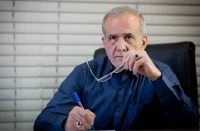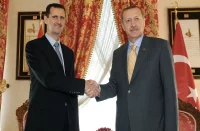Oriental Review publishes an interview with the Russian Foreign Minister Sergei Lavrov that was aired in Russia at the TV-Talk Show Postscriptum on March 27, 2010.
Question: The Strategic Arms Reduction Treaty will most likely be signed this April in Prague. How do you think it will affect Russia’s security?
Lavrov: As you know, we had surfaced the idea of the Treaty long before the Obama administration took over the White House. We told the Bush administration repeatedly that we needed to begin working on a new treaty to replace the START Treaty, which expired in December 2009. I would describe the Bush administration’s reaction to that as rather flippant. Therefore, we welcomed the enthusiasm with which the Obama administration addressed the problem of strategic stability and reduction of strategic offensive arms.
Now, six months later, the Treaty and its accompanying Protocol are ready. I consider that a great achievement because a tremendous amount of work was done in record time. The Treaty is based on full parity of the parties. It gives neither the United States nor the Russian Federation unilateral advantages, and it sets unprecedented low levels for strategic offensive arms. The Treaty also establishes ceilings for the first time, not just on strategic nuclear delivery vehicles but also on strategic delivery vehicles that can be equipped with non-nuclear warheads, and the United States is working on such systems. Therefore, it was vital to set limits for those types of arms, as well. They’re included in the overall counts.
Another important aspect of the Treaty is its recognition of the relationship between strategic offensive and strategic defensive arms. That was of fundamental importance because the current Treaty, in contrast to its predecessor, was negotiated after the United States’ withdrawal from the Anti-Ballistic Missile Treaty. The new Treaty and the Protocol that accompanies it capture that relationship in legal form.
In answer to your question about whether the Treaty was only intended to give meaning to the “reset” concept—I say no. It’s primarily needed to enhance strategic stability in the world and hasten the time when other nuclear states will have to get involved in the strategic offensive arms limitation process.
Question: Will this Treaty get the Americans to hold back on developing a missile-defense system?
Lavrov: I don’t think so. We can’t prevent the United States from working to develop a missile defense, but the Treaty clearly spells out the relationship between those projects and the quantity and quality of strategic offensive arms.
The Treaty and all of the obligations it contains are valid only for the current levels of strategic defensive systems. This applies both to the United States and to the Russian Federation. Violation of those levels will naturally lead the party that documented the violations to make its own decision concerning future strategic offensive systems. The Treaty contains no provisions that would facilitate US development of a missile defense that would constitute a risk to the Russian Federation.
Question: Wouldn’t the adoption of sanctions against Iran be a repetition of the Iraq scenario?
Lavrov: The situations are different, and significantly so. The primary difference concerns the positions taken by the former Iraqi leadership and those of Iran’s current leadership. Iraq was cooperating with international inspections conducted by IAEA experts under UN Security Council mandate and by the UN Special Commission overseeing the disarmament of Iraq. Iraq admitted those inspection teams and responded to all their questions.
As we now know, countries had already made arrangements to attack the Iraqi regime long before the military operations against Iraq began. They simply ignored the international inspectors’ report to the UN Security Council that Iraq had no weapons of mass destruction, a fact which was obvious to impartial members. When the United States and Great Britain attempted to convince the Security Council to pass a resolution authorizing the bombing of Iraq despite the clear findings of the inspectors, they received no support and therefore acted unilaterally. The results of their actions are well-known. We are now facing the consequences together, because waves of instability have swept over the entire Middle East.
But the problem with Iran is that it hasn’t fully cooperated with the IAEA, and that’s why it may be necessary to revisit the situation in the Security Council. That’s why the Iran situation is different.
Question: So the situation with Iran is worse. You answered pessimistically.
Lavrov: As far as cooperation with the IAEA’s international experts is concerned, yes. We want more from Iran. The IAEA professionals still have serious questions, and we’re concerned about the same issues. We want answers to those questions in order to be sure that Iran’s nuclear program is entirely peaceful.
Question: If the situation takes a negative turn, could Russia ever support a military strike against Iran?
Lavrov: Under no circumstances. And as you know, when our Western partners now say that it’s time to discuss sanctions, we say that the time may yet come, but efforts to get the negotiations back on track are still ongoing and there’s still a chance they’ll succeed. If and when it again becomes necessary to take up the question in the Security Council, we’ll be prepared only to discuss smart sanctions, as our President has indicated.
By smart sanctions we mean sanctions that are aimed solely at urging cooperation by the institutions in Iran that are responsible for its nuclear program and not sanctions that would harm the country’s people. The proposals we’ve heard so far bear no resemblance to smart sanctions.
Our position is very clear when it comes to the use of force. Any UN Security Council discussions, if and when they happen, must only concern the development of smart sanctions. And any resolutions passed by the Security Council must clearly state that they cannot be utilized to justify the use of force.
Question: How are your relations with Hillary Clinton shaping up?
Lavrov: Reasonably well. While we’re on the subject of personal relationships, we see good personal relations between the two Presidents—they trust each other; they discuss things very openly and honestly without hiding their concerns, but always expressing a readiness to consider those concerns and try to find common approaches. Incidentally, whatever the Presidents agree to is always implemented. That’s their position, the position of each of them; we understand it, and it obligates us to do a lot of things. As far as my relationship with Ms. Clinton is concerned, our very first contact, when she gave me the famous reset button, was more than just a formal meeting. That was largely due to the fact that Ms. Clinton decided to make a gesture that emphasized her desire to establish a normal personal relationship. We have been able to do that. We understand each other very well. There’s “chemistry” between the two of us, as they say.
Question: Do you have the button in your office?
Lavrov: It’s in the Foreign Ministry’s museum.
Question: There used to be the Chernomyrdin-Gore Commission, which provided a venue in which the Prime Minister of Russia interacted with the Vice President of the United States. That commission no longer exists. Vice President Joe Biden travels the world saying things that are sometimes at complete odds with what Obama says, especially regarding Russia. Why don’t we have a commission like that with Biden?
Lavrov: You have to understand that when we work with foreign partners we establish contacts with the leaders who determine a state’s foreign policy. In relations with the United States those leaders are, of course, President Barack Obama and Foreign Secretary Hillary Clinton, and she is the official, the principal official, responsible for implementing the main course of foreign policy as defined by the President.
Source: New Eastern Outlook














Comments